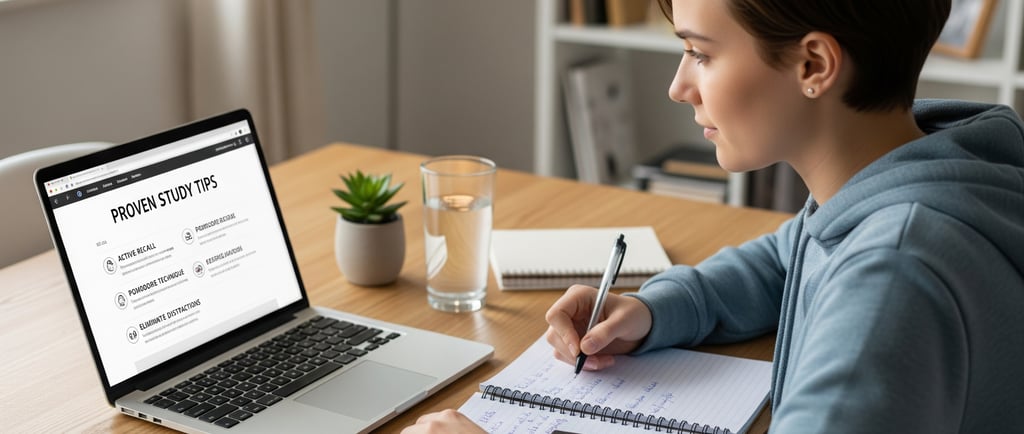Can't Focus? 6 Proven Ways to Improve Your Study Focus Today
Does this sound familiar? You sit down with your textbook, full of good intentions, but ten minutes later you're staring at the same paragraph, your mind a million miles away. In a world overflowing with digital noise and endless notifications, the battle to improve study focus has never been tougher. But what if you could train your brain to concentrate better? What if you had a toolkit of simple, effective strategies to block out distractions and absorb information efficiently? You can. This article breaks down six actionable techniques that will help you transform your study sessions from a frustrating struggle into a period of deep, productive work. Let's get started.
Mayank Soni
8/22/20253 min read


1. Create a Fortress of Focus: Your Study Environment
Your environment dictates your mindset. Studying on your bed or in front of the TV sends mixed signals to your brain. To truly concentrate, you need a dedicated, distraction-free space.
Designate a Zone: Choose a quiet, clutter-free area specifically for studying. This could be a desk in your room, a corner of the library, or a quiet coffee shop.
Go on Digital Detox: The smartphone is the number one focus killer. Put your phone in another room or use an app that blocks distracting websites and notifications for a set period.
Ensure Good Lighting: A well-lit space reduces eye strain and keeps you alert.
The goal is to make your study space a signal to your brain that it's time to work, and nothing else.
2. Set Clear Goals: Know Your Destination
Studying without a goal is like driving without a map you'll get somewhere, but probably not where you intended. Breaking down your massive study load into smaller, manageable tasks provides direction and a powerful sense of accomplishment.
Instead of a vague goal like "study biology," try this:
""Read Chapter 5 (pages 95-112) in the next 45 minutes.""
""Complete 10 practice problems for calculus.""
""Create flashcards for key terms in my history notes."
This approach makes the work less intimidating and keeps you on track, building momentum with every task you check off your list. These are some of the most effective study habits you can build.
3. Master Your Time with the Pomodoro Technique
Your brain isn't designed for marathon, non-stop focus. The Pomodoro Technique is a time management method that embraces this reality, using timed intervals to maximize concentration and prevent burnout.
Here’s how it works:
Choose a task.Set a timer for 25 minutes.
Work on that single task without interruption.
When the timer rings, take a 5-minute break. Stand up, stretch, get some water.
After four "Pomodoros" (100 minutes of work), take a longer break of 15-30 minutes.
This technique is incredibly effective because it forces you into short bursts of deep work while assuring your brain that a break is always just around the corner.
4. Prioritize Like a Pro: Tackle the Big Rocks First
Not all study tasks are created equal. You have a limited amount of peak mental energy each day, so it's crucial to spend it on what matters most.
Before you start, quickly identify your most difficult or important subject for the day. Tackle that high-priority task first. When your mind is fresh and alert, you're better equipped to handle complex problems and challenging material. Leaving the easier, less demanding tasks for later in your session prevents you from wasting your best brainpower on low-impact work.
5. The Power of the Pause: Why Regular Breaks Are Essential
It might feel counterintuitive, but one of the best study tips for students is to study less—or rather, to break up your studying more. Back-to-back hours of studying lead to diminishing returns and mental fatigue.
Short, planned breaks are scientifically proven to help your brain recharge and consolidate information. During your break, step away from your desk completely.
Do some light stretching.
Walk around the room.
Listen to a song.
Look out the window.
These brief pauses help reset your attention span, allowing you to return to your work with renewed focus and a clearer mind.
6. Fuel Your Brain: The Physical Side of Focus
Your mental performance is directly linked to your physical well-being. You can’t expect your brain to run at 100% if its basic needs aren't met.
Stay Hydrated: Dehydration can cause headaches, fatigue, and brain fog. Keep a water bottle on your desk at all times.
Eat Smart: Fuel your brain with balanced meals rich in nutrients. Avoid heavy, sugary foods that cause an energy crash.
Get Enough Sleep: Sleep is when your brain processes and stores the information you learned during the day. Aim for 7-9 hours of quality sleep to ensure you're alert and ready to learn.
These brief pauses help reset your attention span, allowing you to return to your work with renewed focus and a clearer mind.
Conclusion: Your Path to Better Focus
Stopping distractions and building intense focus is a skill, and like any skill, it gets stronger with practice. You don't have to implement all these strategies at once. Start with one or two that resonate most with you.
To recap, the keys to unlocking your focus are:
Optimize your environment.
Set clear, small goals.
Work in timed intervals using the Pomodoro Technique.
Prioritize your most challenging tasks.
Take regular, refreshing breaks.
Support your brain with proper sleep, hydration, and nutrition.
By integrating these habits into your routine, you can avoid distractions while studying and make your learning time far more efficient and rewarding.
Get In Touch
Premium PG accommodation for aspiring female students.
FAQ
Copyright © 2025 | Aspiro Living
Office Address:
Email:
info@aspiroliving.com
12-A/26 Karol Bagh, Delhi-110005
Contact:
